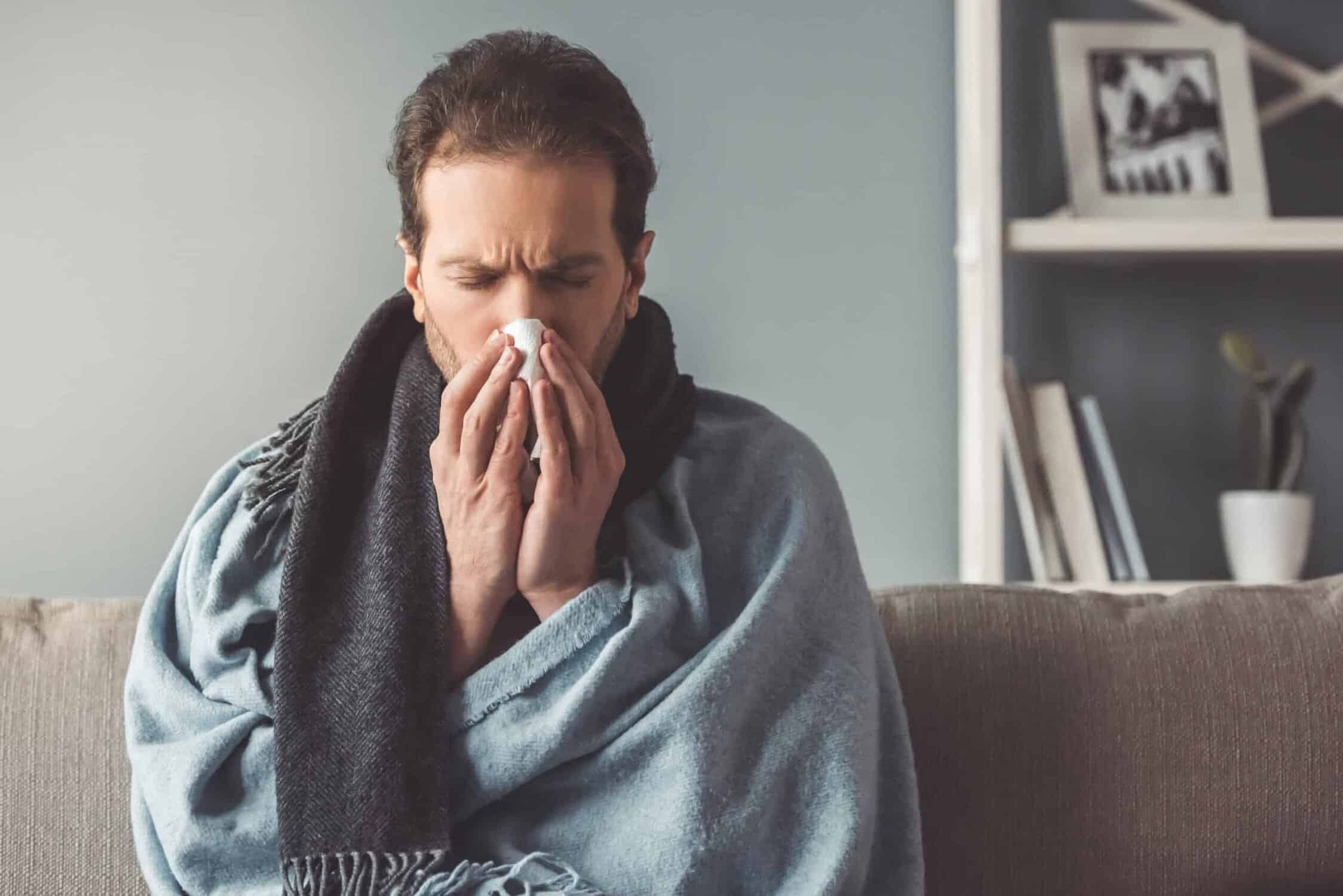Everyone comes down with the occasional bug, but as a runner, it can be especially frustrating to catch a cold mid-way through a training block. “Getting sick” is a broad term. It encompasses everything from a head cold with a little nasal congestion and headaches to catching the seasonal flu with fever, chills, and fatigue. In the latter case, it’s probably obvious that running while sick with the flu isn’t the best idea.
However, if you’re experiencing manageable cold symptoms, and you’re on a training schedule, it gets more gray.
So, should you take a few days off to rest when you’re under-the-weather, or is it ok to run through it?
“Like many things in life, the greatest benefits come with some risk…this is especially true when considering exercising when injured or ill,” says David Cutler, MD, board-certified family medicine physician at Providence Saint John’s Health Center in Santa Monica, CA.
The decision to run when you’re sick depends on various factors, including the severity of your illness and how your body feels, Dr Cutler adds.
For the avoidance of doubt, we consulted Dr. Cutler, and read the medical research and simplified it down for the next time you’re down and out with the sniffles.

Can I Run When I Have a Cold?
There’s no easy answer — Dr. Cutler says the balance of benefit-to-risk entirely depends on you, your illness, and your current training.
Reasons Why You Should Consider Running
The general consensus is that if you have a mild illness (like the common cold) and your symptoms are above the neck (i.e. runny nose, sneezing, stuffy nose), it is ok to go for a lower intensity short run at an easy pace.
You may hear this called the “The Neck Rule,” which is really just about using the divisional line of running to whether your ailment falls above or below the neck symptoms.
And, not only is it safe to exercise, it could actually help alleviate symptoms. Light exercise will increase blood circulation and boost endorphins, Dr. Cutler adds.
He adds that for some people, maintaining a training schedule helps to provide a sense of normalcy and routine, and the act of running can help to reduce stress and improve mood.
“In some cases, going for a run might make you feel better emotionally even if it doesn’t directly positively or negatively impact your physical illness,” he explains.
That being said, if you’re any level of sick, it’s only polite to skip your running club, strength training or treadmill exercise routine in your neighborhood gym to contain the spreading of what you’ve come down with.
Why (And When) You Should Consider Resting Instead
If your symptoms are at the neck or below (i.e. sore throat, cough, swollen glands, body aches, shortness of breath, chest congestion, fever etc.), you shouldn’t run.
Moreover, if you feel more than mildly ill, skip your run.
“Running while sick, especially with more severe illnesses like the flu or fever, can exacerbate symptoms and prolong recovery time,” Dr. Cutler warns.
It can also increase the risk of complications, such as respiratory issues or dehydration.
What’s more, while we all believe sticking to your training schedule is highly important, Dr. Cutler points out that when you’re more than mildly sick, your performance usually suffers anyway.
Not only are you more tired, but you run a higher risk of injury due to compromised coordination and muscle function.
And, while we respect the sanctity of a training schedule, it’s more helpful to heal and get back on the track sooner rather than log every single run at a very sub-optimal level.
The bottom line – When in doubt, take a rest day.
“It’s crucial to listen to your body and prioritize rest and recovery when necessary,” Dr. Cutler adds. Give your body time to rest and put all its energy toward fighting any infection, rather than having to partition energy between exercise and recovery.
An extra few days off could save weeks or even months of difficulties down the line. And if you don’t feel better after a few days of rest, definitely call your doctor to make sure nothing more serious is going on.
And, if you aren’t sure, ask your doctor.
How To Test If You’re Ok for Running While Sick
You’re probably familiar with the idea of RPE which is the rate of perceived exertion and is used in heart rate training to ensure you’re not running too hard for your fitness level.
When it comes to sickness, consider applying the same principles.
Let’s say you’re not sure if you’re feeling up for your run. If you’re encouraged by the idea of running – start with a brisk walk. Monitor your symptoms and your heart rate. If you’re seeing all signs point to a normal response, increase to a low-intensity jog.
If your body is responding poorly to the increased activity, either reduce the speed or stop altogether.
Should I Run Symptom Checker
| Ok To Run | Take a Rest |
| Sneezing | Fever |
| Nasal Congestion | Muscle Aches |
| Cough | Chest Congestion |
| Runny Nose | Chest Pain |
| Sore Throat | Nausea/Vomiting |
How Can I Avoid Getting Sick as a Runner?
The good news is that being a runner already puts you at lower risk of catching common illnesses like colds and flus than most people: A 2021 study in Sports Medicine found running regularly (or doing any habitual physical activity as regular exercise) reduces your risk for catching an infectious disease from others by 31%.
While it is impossible to completely avoid getting ill, there are plenty of actions you can take to reduce your likelihood of succumbing to a cold, even if you do come into contact with the virus.
“The best way to support your immune system is to maintain good general fitness, hydrate, eat a healthy diet, manage your stress, and get adequate sleep,” Dr. Cutler says.
Here’s how else you can reduce your chances of getting sick while training.
Know when you’re most vulnerable.
Here’s the good news: Regular, moderate and vigorous training (such as frequent long or short runs and sporadic speed work) generally keeps your immune system up and illness risk down, according to a 2019 study review in the Journal of Sport and Health Science.
However, the same study found that when athletes were in periods of intense training and competition, their susceptibility to getting sick was higher. Meanwhile, other research published in 2020 found that long-distance runs (considered over 10 miles, or running to exhaustion) can temporarily suppress the immune system.
The takeaways: For one, if you feel anything coming on, scale back your training and skip your intense or long runs.
But these studies also show us that your immune system is more vulnerable during training blocks where you’re pushing your body hard or race days – so support it accordingly.
More intuitively, if your energy levels are being exhausted due to your training, that energy depletion might impact the strength of your immune system.
Eat sufficiently, especially while running
Eating enough calories to support your training is one of the best ways to avoid being impacted by illness.
Your immune system requires energy to work effectively, and without sufficient nutrients and calories, it can become sluggish.
Dr. Cutler points out there are no vitamins or herbs which can augment your immune system to prevent or recover more quickly from illness.
But what can help: Regularly eat a healthy balance of protein, fat, and carbs and fill your plate with mostly colorful vegetables and fruit.
Get enough rest
Your body repairs itself when at rest and, moreover, when asleep. Without enough of both, any illness in the system has more of a chance of gaining a foothold and causing symptoms.
Make sure passive rest days are a cornerstone of your training regime and, like we said above, if you’re feeling run down or under the weather, take a rest day! One day off early on in crumminess can be enough to reduce both the duration and intensity of any oncoming illness.
Prioritize sleep
Like we said above, quality and lengthy sleep is crucial for your body to repair itself in every way, from muscle recovery to immune fortification. Sleep should be your top training priority next to quality nutrition and training runs.
The good news: Research shows one of the best things you can do for better sleep is exercise regularly. But make sure you’re also doing the other best practices: maintain a consistent sleep/wake schedule, have a regular bedtime routine, and aim for 7 to 9 hours of sleep per night.
But it’s important to listen to what your body wants right now: When we’re sick, our body naturally tries to sleep for longer, according to a 2019 paper from German researchers. So, if you’re yawning earlier than usual or you sleep past your normal wake-up on a weekend rest day, heed your body’s desires.





